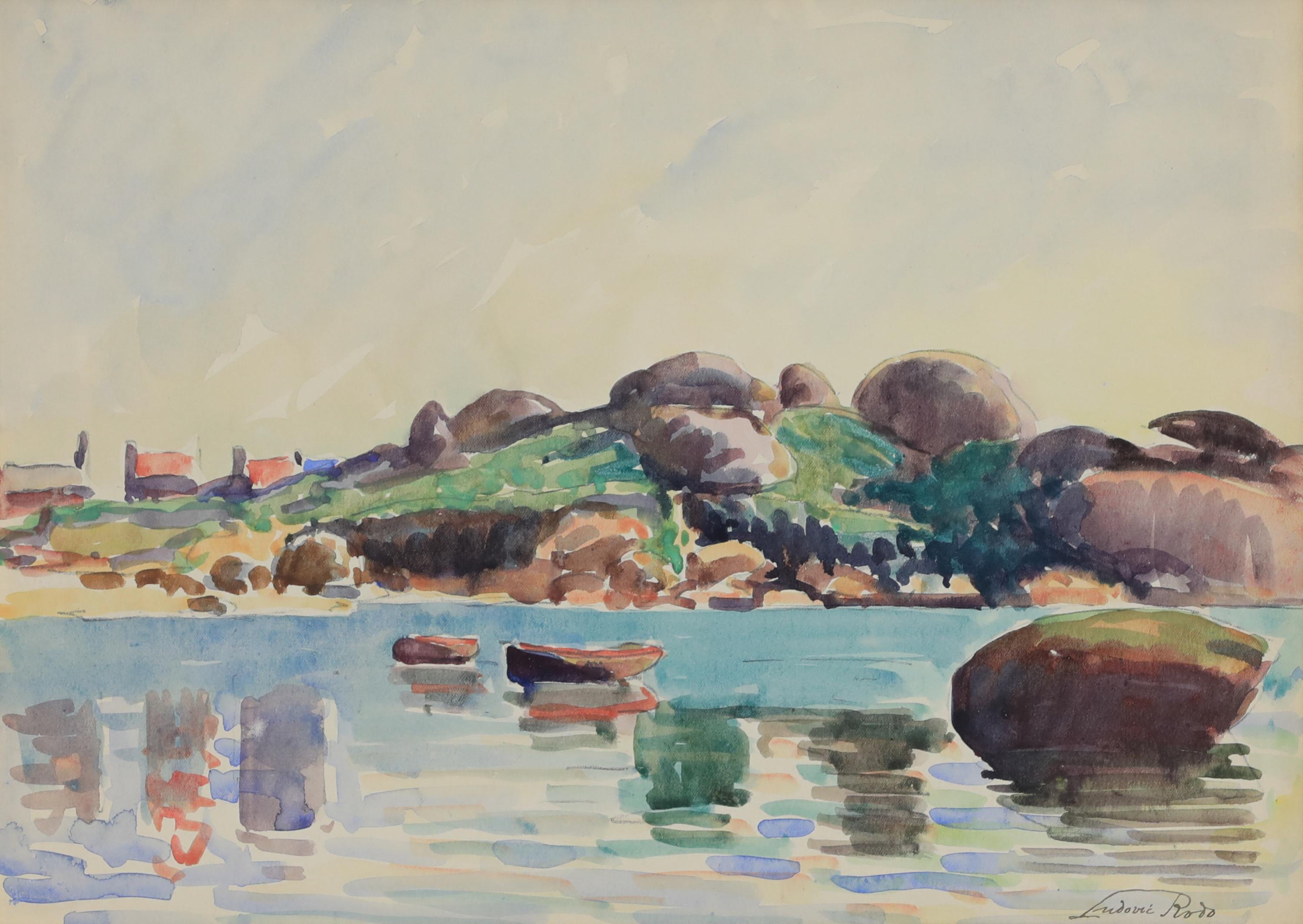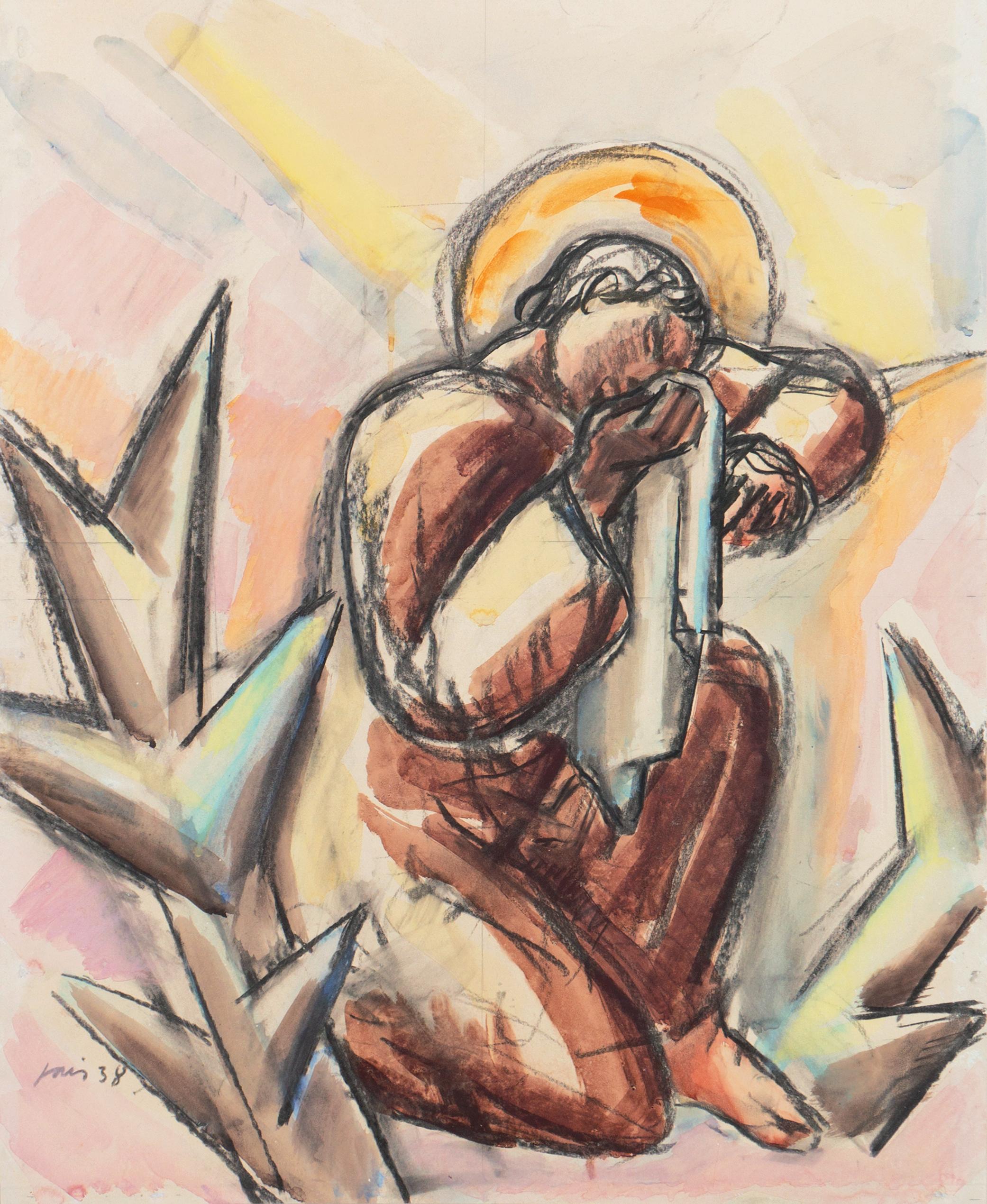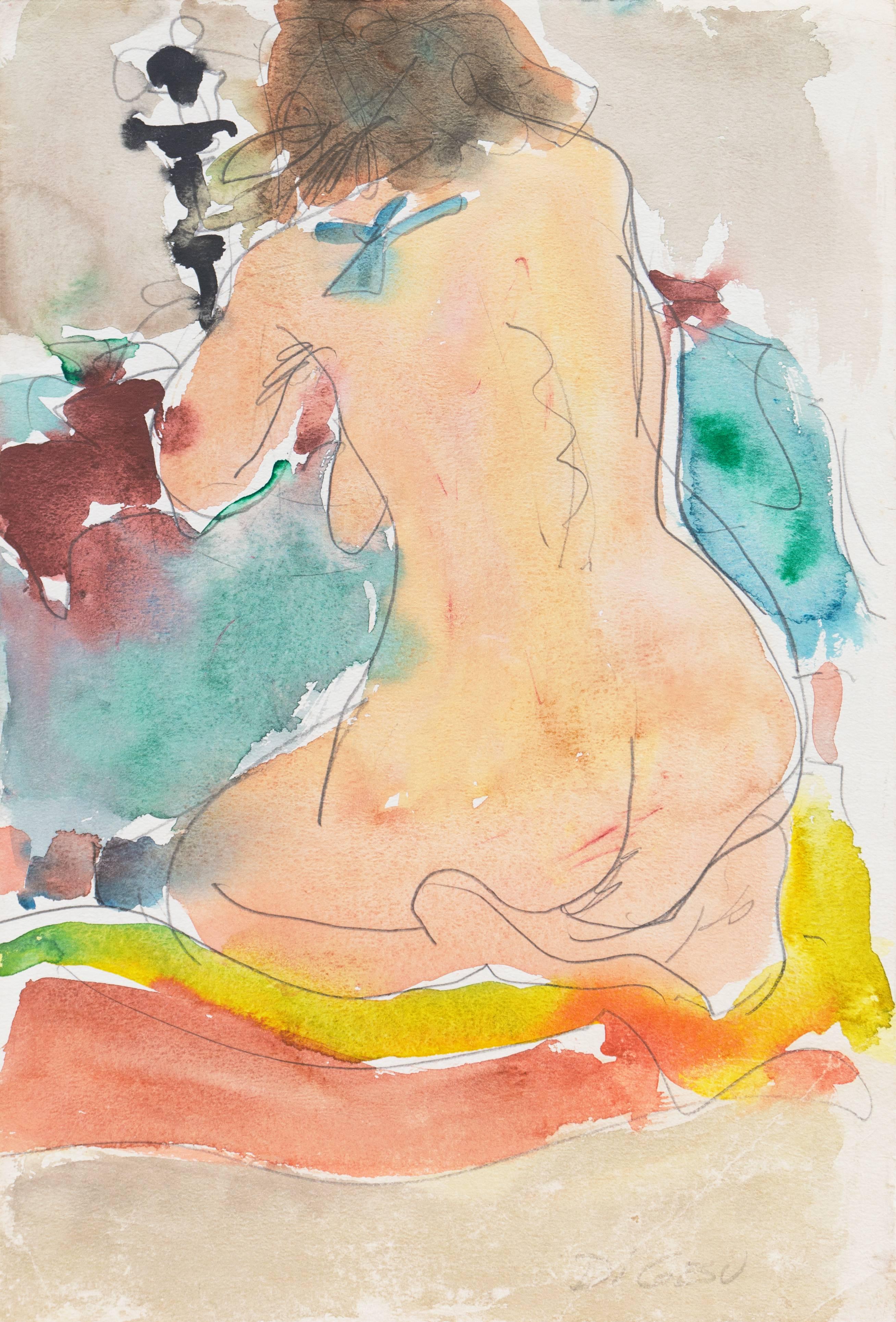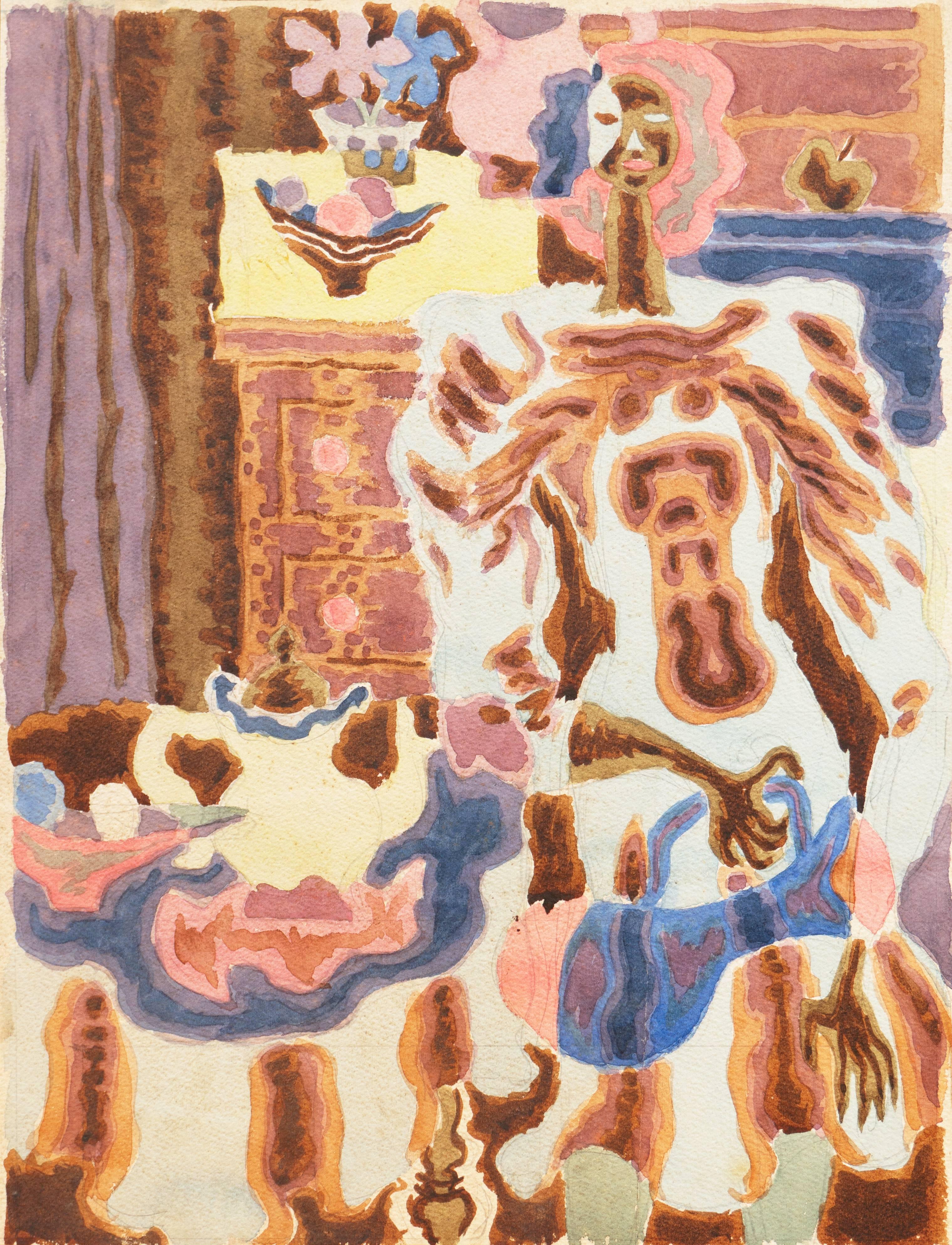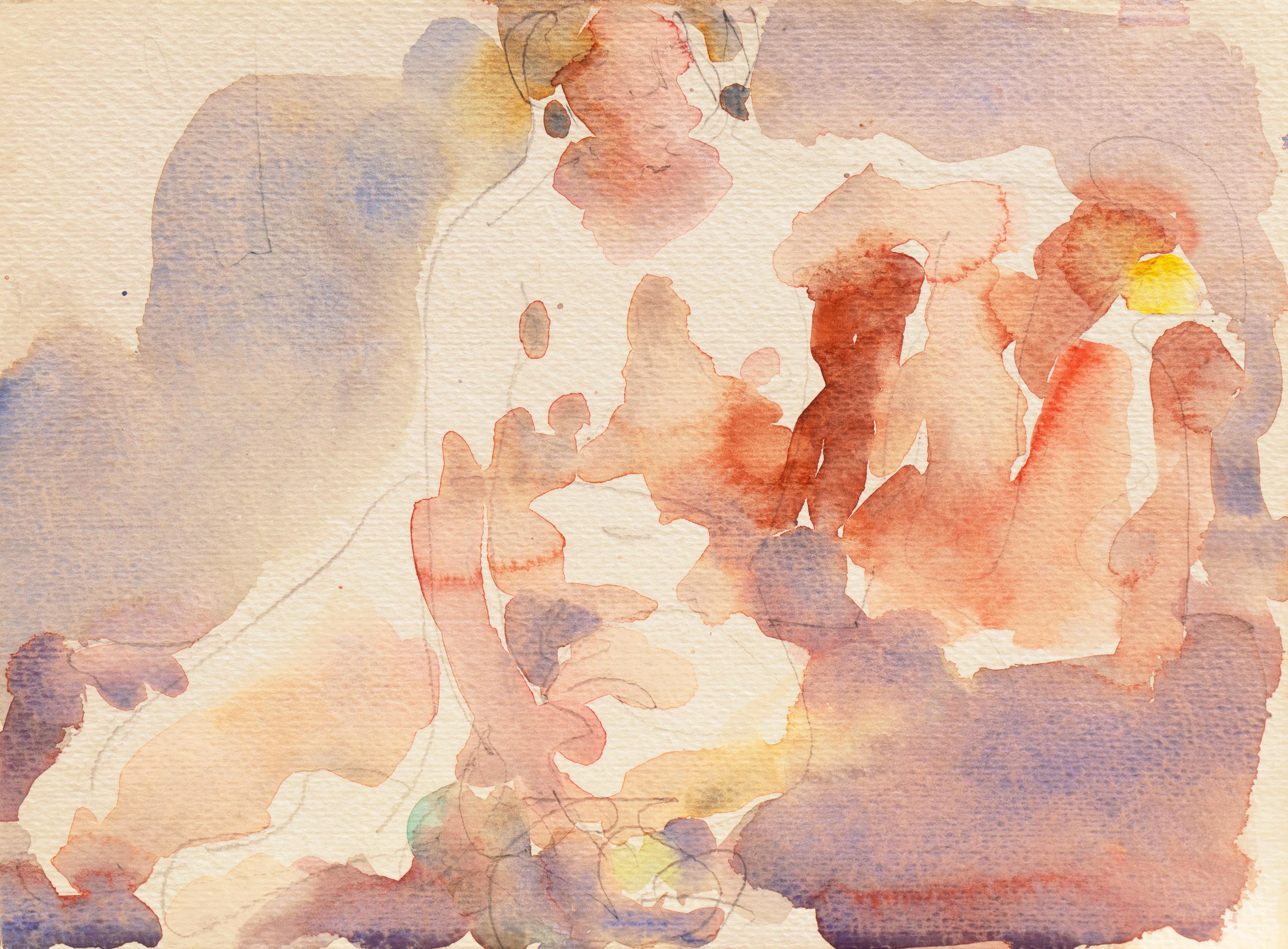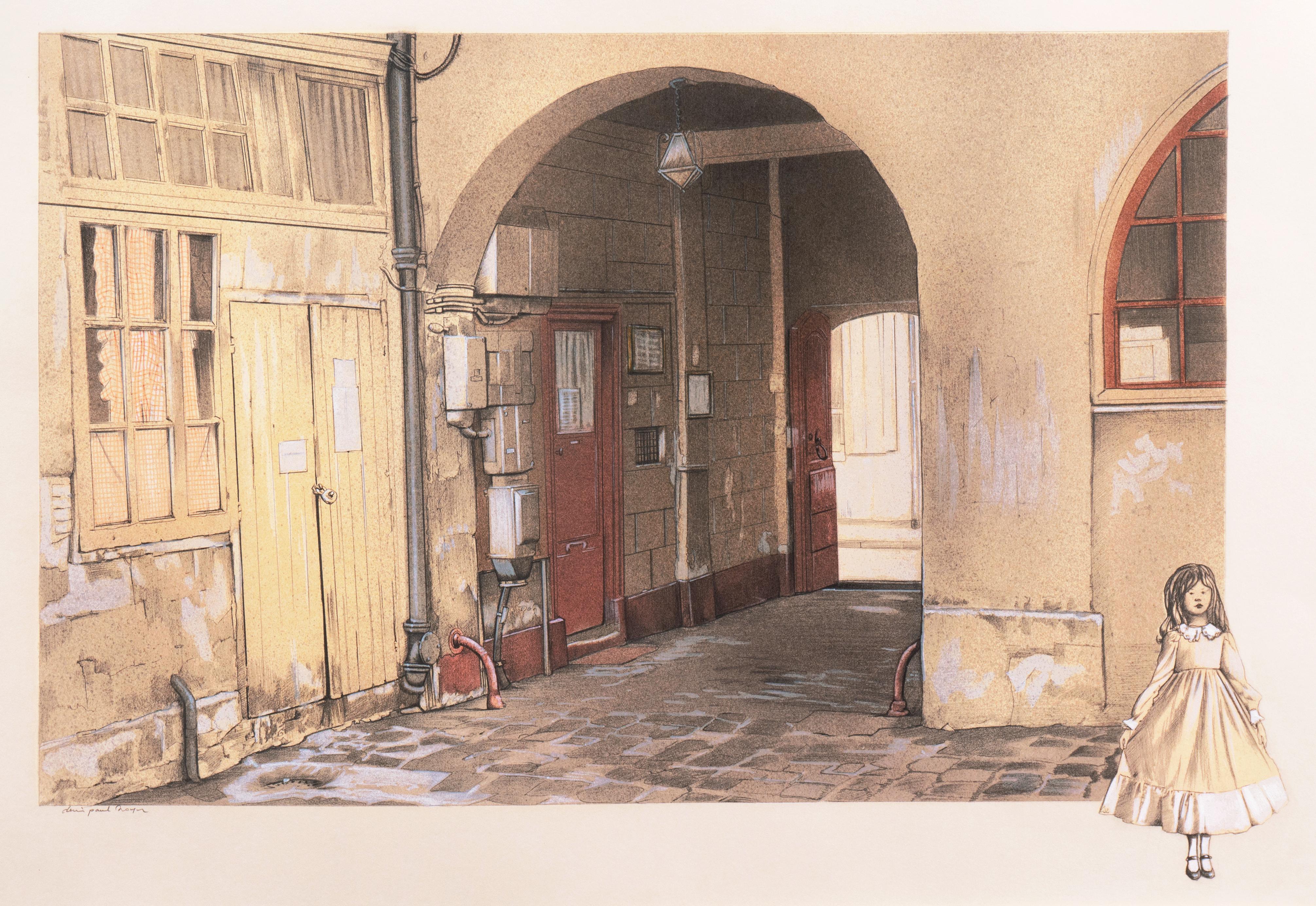Ludovic-Rodo PissarroLes Deux Femmes Élégantes, Watercolour and Pencil on Paper, circa 1901circa 1901
circa 1901
About the Item
- Creator:Ludovic-Rodo Pissarro (1878 - 1952, French)
- Creation Year:circa 1901
- Dimensions:Height: 8.59 in (21.8 cm)Width: 5.79 in (14.7 cm)
- Medium:
- Movement & Style:
- Period:
- Condition:
- Gallery Location:London, GB
- Reference Number:1stDibs: LU26128407632
Ludovic-Rodo Pissarro
Ludovic-Rodolphe Pissarro, born in Paris in 1878, was influential French Impressionist painter Camille Pissarro’s fourth son. Encouraged by his father, he began drawing from nature at an early age. He was familiarly known as “Rodo” and generally signed his works "Ludovic-Rodo,” or early on in his career, "Rodo.”
The impact of Camille’s art and teaching on Rodo was considerable, and his artistic production encompassed a wide range of media, including oil painting, tempera, watercolour, gouache, wood engraving, drawing and lithography. Rodo exhibited regularly at the Salon des Indépendents over a 40-year period.
In 1894, at the age of 16, Rodo published his first wood engravings in the anarchist journal, Le Père Peinard. When Camille left France for the safety of Belgium during the anarchist upheavals of the same year, Rodo joined him there.
Rodo moved into his first studio in Montmartre with his brother Georges in 1898. He found the nightlife of Paris and the habitués of the cafes, theatres, circuses and cabarets of the area compelling subjects for his work. With his younger brother, Paulémile, Rodo met artists such as Kees van Dongen, Maurice de Vlaminck and Raoul Dufy. In 1905, he participated in the first Fauve exhibition at the Salon des Indépendants.
At the outbreak of the War in 1914, Rodo moved to England. Over the next few years, he lived mainly in and around West London. He worked closely with his brother, Lucien, to establish, in 1915, the Monarro Group, formed with the aim of exhibiting work by contemporary artists inspired by Impressionism. Many of the works, produced by Rodo while he was in England, were of major London landmarks. After 1924, when Rodo had already returned to France, he divided his time between Paris and Les Andelys in Normandy. Despite his rich artistic heritage and his achievements as an artist, Rodo is perhaps best remembered for his contribution to art history. For 20 years, he researched and compiled a catalogue of his father’s paintings – a project that was finally published in two volumes in 1939 — and is still considered to be the definitive reference book on Camille’s work. Rodo told Lucien that the compilation of this catalogue was a fascinating task, revealing as it did “the work of the artist, its highs and lows, its progress, as a whole, through acquired experience.”
(Biography provided by Stern Pissarro Gallery)
- ShippingRetrieving quote...Ships From: London, United Kingdom
- Return PolicyA return for this item may be initiated within 7 days of delivery.
- Paysage de l'Aven by Ludovic-Rodo Pissarro - Watercolour, Coastal sceneBy Ludovic-Rodo PissarroLocated in London, GB*UK BUYERS WILL PAY AN ADDITIONAL 20% VAT ON TOP OF THE ABOVE PRICE Paysage de l'Aven by Ludovic-Rodo Pissarro (1878-1952) Watercolour and pencil on paper 27 x 38 cm (10 ⅝ x 15 inc...Category
Early 1900s Post-Impressionist Landscape Drawings and Watercolors
MaterialsPaper, Watercolor, Pencil
- Draveil by LUDOVIC-RODO PISSARRO (1878-1952) - Watercolour on paperBy Ludovic-Rodo PissarroLocated in London, GB*UK BUYERS WILL PAY AN ADDITIONAL 20% VAT ON TOP OF THE ABOVE PRICE Draveil by LUDOVIC-RODO PISSARRO (1878-1952) Watercolour on paper 24 x 32 cm (9 1⁄2 x 12 5⁄8 inches) Titled and ...Category
Early 20th Century Post-Impressionist Landscape Drawings and Watercolors
MaterialsWatercolor, Pencil, Paper
- La Maison Rose, Les Andelys by Ludovic-Rodo Pissarro - Landscape, watercolourBy Ludovic-Rodo PissarroLocated in London, GB*UK BUYERS WILL PAY AN ADDITIONAL 20% VAT ON TOP OF THE ABOVE PRICE La Maison Rose, Les Andelys by Ludovic-Rodo Pissarro (1878-1952) Watercolour, ink and ...Category
1930s Post-Impressionist Figurative Drawings and Watercolors
MaterialsInk, Paper, Watercolor, Pencil
- Moroccan Dancer by Georges Manzana Pissarro - Nude drawingBy Georges Henri Manzana PissarroLocated in London, GB*UK BUYERS WILL PAY AN ADDITIONAL 20% VAT ON TOP OF THE ABOVE PRICE Moroccan Dancer by Georges Manzana Pissarro (1871-1961) Watercolour, coloured crayon and pencil 26.3 x 20.2 cm ( ...Category
1940s Post-Impressionist Figurative Drawings and Watercolors
MaterialsPaper, Crayon, Watercolor, Pencil
- Study of a Dancer and a Lady by Ludovic-Rodo Pissarro - WatercolourBy Ludovic-Rodo PissarroLocated in London, GB*UK BUYERS WILL PAY AN ADDITIONAL 20% VAT ON TOP OF THE ABOVE PRICE Study of a Dancer and a Lady by Ludovic-Rodo Pissarro (1878-1952) Watercolour and pencil on paper 21 x 15.7 cm (8...Category
Early 1900s Fauvist Figurative Drawings and Watercolors
MaterialsPaper, Watercolor, Pencil
- Les Élégantes by Ludovic-Rodo Pissarro - WatercolourBy Ludovic-Rodo PissarroLocated in London, GB*UK BUYERS WILL PAY AN ADDITIONAL 20% VAT ON TOP OF THE ABOVE PRICE Les Élégantes by Ludovic-Rodo Pissarro (1878-1952) Watercolour and pencil on paper 1...Category
Early 1900s Post-Impressionist Figurative Drawings and Watercolors
MaterialsPaper, Watercolor, Pencil
- 'The Agony in the Garden', Paris, Salon d’Automne, Section d'Or, GethsemaneBy Jais NielsenLocated in Santa Cruz, CASigned lower left, 'Jais' for Johannes Knud Ove Jais-Nielsen (Danish, 1885-1961) and dated 1938. A powerful figural work showing a view of Jesus kneeling in the Garden of Gethsemane on the evening before his trial and execution. Born in Denmark, Jais Nielsen initially studied at Kunstnernes Frie Studieskoler under Kristian Zahrtmann and exhibited for the first time at the 1907 Autumn Salon at the Charlottenborg Palace. Nielsen participated in the early and groundbreaking, “Group of Thirteen" Modernist show, where his focus on dynamic figural painting and his bold use of color set him dramatically apart from his contemporaries. From 1907-11, Nielsen's use of 'primitive' Fauve colors would continue to reinforce his break with traditional Danish painting. During this period, he made study excursions to important art centres, including, in 1909, to Berlin. In 1911, he moved to Paris where he settled in the Latin Quarter near the Musée Cluny. His first formal Paris exhibition was at the Salon d’Automne of 1912. During this first Paris period, Nielsen attended meetings of the Section d’Or at the studio of Jacques Villon and, as a result, began to incorporate subtle, yet distinct, Cubist elements into his work. With the outbreak of World War One, Nielsen returned to Copenhagen, taking with him both his increasing compositional sophistication and a thorough understanding of the principles of Modernism. During this period, ports, dance and circus life became subjects of interest and he painted many canvases in the style of Analytic Cubism, of which he became the earliest and, arguably, the finest Danish exponent. From 1915 onwards, Nielsen also created Cubist sculptures and, from 1922-28, was employed as a sculptor by the Royal Copenhagen porcelain factory. Here, he produced a series of ceramic sculptures on Biblical themes which included the Good Samaritan and several versions of Jacob Wrestling with the Angel...Category
1930s Post-Impressionist Figurative Drawings and Watercolors
MaterialsGraphite, Charcoal, Paper, Gouache, Watercolor
- 'Kneeling Nude', Louvre, Académie Chaumière, LACMA California Post-ImpressionistBy Victor Di GesuLocated in Santa Cruz, CASigned lower right, "Di Gesu" for Victor di Gesu (American, 1914-1988) and painted circa 1955. Watercolor nude showing a woman kneeling with her back to the viewer. Winner of the P...Category
1950s Post-Impressionist Nude Drawings and Watercolors
MaterialsGraphite, Paper, Watercolor
- 'Woman Seated', Louvre, Académie Chaumière, LACMA, California Post-ImpressionistBy Victor Di GesuLocated in Santa Cruz, CABearing Victor Di Gesu estate stamp verso and painted circa 1955. Watercolor figurative showing an abstracted view of a woman standing in an interior holding a pitcher, with a table...Category
1950s Post-Impressionist Figurative Drawings and Watercolors
MaterialsGraphite, Paper, Watercolor
- 'French Courtyard', Large School of Paris Drawing, Ecole des Beaux Arts, LyonBy Denis Paul NoyerLocated in Santa Cruz, CASigned lower left, 'Denis Paul Noyer' (French, b. 1940) and created circa 1975. An exceptionally finely-detailed, silver point and colored pencil drawing showing a view of a Parisia...Category
1960s Post-Impressionist Landscape Drawings and Watercolors
MaterialsMetal
- 'Reclining Nude', Paris, Louvre, Salon d'Automne, Ac. Chaumière, LACMA, SFAABy Victor Di GesuLocated in Santa Cruz, CAPainted by Victor di Gesu (American, 1914-1988) circa 1955 and with Di Gesu estate stamp verso. A loosely painted, Post-Impressionist study of a woman shown nude and seated. Winner...Category
1950s Post-Impressionist Nude Drawings and Watercolors
MaterialsWatercolor, Paper, Graphite
- 'Old Carmel Cottage', Paris, Louvre, Salon d'Automne, Ac. Chaumière, LACMA, SFAABy Victor Di GesuLocated in Santa Cruz, CACreated circa 1955 by Victor Di Gesu (American, 1914-1988) and stamped verso with certification of authenticity. A mid-twentieth century watercolor and graphite study of an early c...Category
1950s Post-Impressionist Landscape Drawings and Watercolors
MaterialsPaper, Watercolor, Graphite
